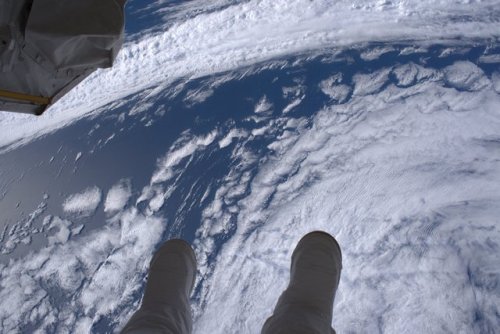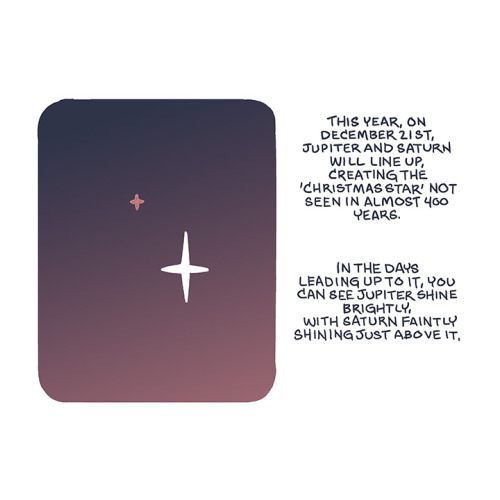Spaceprob.es



Spaceprob.es
More Posts from Fillthevoid-with-space and Others

It’s a long ways down. This is a view from the vantage point of astronaut Shane Kimbrough during his spacewalk last Friday outside the International Space Station. Shane posted this photo and wrote, “ View of our spectacular planet (and my boots) during the #spacewalk yesterday with @Thom_astro.” During the spacewalk with Kimbrough and Thomas Pesquet of ESA, which lasted just over six-and-a-half hours, the two astronauts successfully disconnected cables and electrical connections to prepare for its robotic move Sunday, March 26.
Two astronauts will venture outside the space station again this Thursday, March 30 for the second of three spacewalks. Kimbrough and Flight Engineer Peggy Whitson will begin spacewalk preparation live on NASA Television starting at 6:30 a.m. EST, with activities beginning around 8 a.m. Watch live online here.
Make sure to follow us on Tumblr for your regular dose of space: http://nasa.tumblr.com

(I broke the last link, whoops)
Another week of theory, but no fun new particles. Instead, hear me try to say a lot of names of scientists or their eponymous equations as I talk about dark energy in the universe! Learn what some astronomers think it is and why other astronomers think there are better explanations for certain nutty galactic phenomena.
Below the cut are my sources, music credits, a vocab list, and the transcript of this episode. Let your voice be heard and tell me what you think I should research next by messaging me here, tweeting at me at @HDandtheVoid, or asking me to my face if you know me in real life. And please subscribe to the podcast on iTunes, rate it and maybe review it, and tell friends if you think they’d like to listen!
(If anything about dark matter or dark energy or cosmic microwave background radiation confused you over the past few podcasts, for sure send me your questions so I can ask someone more qualified than me—my doctorate student friend! My thoughts on the next episode are still the Voyager golden records, space race history, the transit of Venus, the Moon landing, Edmond Halley, or Dark Sky Preserves and it will be up on November 20th.)
Glossary
baryons - heaviest particles. Ex. Protons, neutrons. In astroparticle physics, electrons are included in baryonic matter.
cosmic microwave background radiation - the electromagnetic radiation left over from the time of recombination in Big Bang cosmology.
dark energy - a theoretical force made up of unknown, undetectable energy. It is used to explain why the universe is expanding more rapidly over time instead of slowing its expansion.
dark matter - a theoretical mass made up of unknown particles that have not been created on Earth. It is used to explain why galaxy clusters have 10x the mass that their light output suggests they would have; why distant stars on the edges of spiral galaxies orbit at the same speed as stars near the center of the galaxy; and the accretion of gases that created galaxies at the beginning of the universe.
fundamental forces - four fundamental forces in our current model of the universe: the strong and weak nuclear forces, the electromagnetic force, and gravity.
gravitational lensing - when light from more distant sources passes near a massive star, galaxy, or galaxy cluster and the object’s gravity bends the light like a lens to provide a warped angle view of space.
Transcript
Sources
Dark energy via NASA
Dark energy via Hubble
“The strangeness of dark energy is thrilling.”
Fundamental forces via Georgia State University
Dark energy via Science Magazine (April 2017)
László Dobos: “We assume that every region of the universe determines its expansion rate itself.”
Dark energy and the South Pole Telescope via Smithsonian Magazine (April 2010)
“Knowing what dark matter is would help scientists think about how the structure of the universe forms. Knowing what dark energy does would help scientists think about how that structure has evolved over time—and how it will continue to evolve.”
Intro Music: ‘Better Times Will Come’ by No Luck Club off their album Prosperity
Filler Music: ‘Even The Darkness Has Arms’ by The Barr Brothers off their album The Sleeping Operator
Outro Music: ‘Fields of Russia’ by Mutefish off their album On Draught
SpaceX SES-10 Mission successfully Launch
SpaceX - Falcon 9 / SES-10 Mission patch. March 31, 2017
Falcon 9 carrying SES-10 satellite launch
SpaceX took a step into the future Thursday as it reused – for the first time – a recovered first stage of a previously-flown Falcon 9 rocket. Thursday’s mission, carrying the SES-10 communications satellite, lifted off from Pad 39A at Florida’s Kennedy Space Center Thursday 30 March at 18:27 local time (22:27 UTC) and once again landed the booster.
Falcon 9 launch of SES-10
Thursday’s mission made use Falcon 9 the second orbit-capable rocket – after the Space Shuttle – to achieve partial reusability. The Falcon 9 flew from Launch Complex 39A at the Kennedy Space Center, the same pad from which the Shuttle began eighty-two of its missions, including its first and final flights. Reusability has long been a key objective for SpaceX. Making the company’s first launch in March 2006, the small Falcon 1 vehicle carried a parachute system intended to bring its spent first stage back to Earth.
Falcon 9 first stage landed on drone barge
SpaceX’s Falcon 9 rocket deliver SES-10, a commercial communications satellite for SES, to a Geostationary Transfer Orbit (GTO). SES is a world-leading satellite operator, providing reliable and secure satellite communications solutions across the globe.
SES-10 satellite
The SES-10 mission mark a historic milestone on the road to full and rapid reusability as the world’s first reflight of an orbital class rocket. Falcon 9’s first stage for the SES-10 mission previously supported the successful CRS-8 mission in April 2016. For more information about SpaceX, visit: http://www.spacex.com/ Images, Video, Text, Credits: SpaceX/SES. Greetings, Orbiter.ch Full article

We will not leave the crew hanging!
The crew module uprighting system rotates Orion should it come to rest upside down when landing in the water.

In the Heart of the Virgo Cluster : The Virgo Cluster of Galaxies is the closest cluster of galaxies to our Milky Way Galaxy. The Virgo Cluster is so close that it spans more than 5 degrees on the sky - about 10 times the angle made by a full Moon. With its heart lying about 70 million light years distant, the Virgo Cluster is the nearest cluster of galaxies, contains over 2,000 galaxies, and has a noticeable gravitational pull on the galaxies of the Local Group of Galaxies surrounding our Milky Way Galaxy. The cluster contains not only galaxies filled with stars but also gas so hot it glows in X-rays. Motions of galaxies in and around clusters indicate that they contain more dark matter than any visible matter we can see. Pictured above, the heart of the Virgo Cluster includes bright Messier galaxies such as Markarians Eyes on the upper left, M86 just to the upper right of center, M84 on the far right, as well as spiral galaxy NGC 4388 at the bottom right. via NASA
js

LUCIDA
[noun]
the brightest star in a constellation.
Etymology: from the full phrase in Latin stella lūcida meaning “bright star”. Lucida can be traced to the Latin verb lūcēre, "to shine,“ from lux, "light.”
[Tim Barton - Amber of the Void]
I love this comic a lot! You can read it all online to make sure you want to buy it, and then you should buy it because it’s extremely excellent. It’s about preservation in space and also love and found families! And it’s absolutely beautiful. I met Tillie while she was in my town signing her comic Spinning (also excellent) and she drew one of the fish spaceships for me and she was so kind even though I am terrible at smalltalk. Check her comic out!

OH MY! Here’s the cover for ON A SUNBEAM the graphic novel. Coming out this fall!!!!



Description: A four panel comic. In the first two panels, me and my father are squinting at the night sky before I brighten and declare that ‘OH! I see it!’ In the next panel is the night sky with two stars. One bright one in the lower right center and a slightly dimmer one just above and to the left of the first one. Text reads: ‘This year, on December 21st, Jupiter and Saturn will line up, creating the ‘Christmas Star’ not seen for almost 400 years. In the days leading up to it, you can see Jupiter shine brightly, with Saturn faintly shining just above it.’ In the final panel I am closing my window and looking up at the sky. Captions read: ‘I keep looking up, finding and refinding it.’ And ‘The planets are always there, but this moment makes it all seem so fleeting.’
September 15
This one is technically not yet history, because at the time of posting, the little craft has about half an hour left to go. That said, let’s proceed.
In 2017, NASA’s Cassini space probe ended its twenty-year mission at Saturn. After a nearly-seven-year-long journey there, it orbited the ringed planet for 13 years and just over two months, gathering copious amounts of information about the planet, said rings, and many of its moons. It landed an ESA probe called Huygens on Titan, the first-ever soft landing in the outer Solar System. It discovered lakes, seas, and rivers of methane on Titan, geysers of water erupting from Enceladus (and passed within 50 miles of that moon’s surface), and found gigantic, raging hurricanes at both of Saturn’s poles.
And the images it returned are beautiful enough to make you weep.
On this day in 2017, with the fuel for Cassini’s directional thrusters running low, the probe was de-orbited into the Saturnian atmosphere to prevent any possibility of any contamination of possible biotic environments on Titan or Enceladus. The remaining thruster fuel was used to keep the radio dish pointed towards Earth so the probe could transmit information about the upper atmosphere of Saturn while it was burning up due to atmospheric friction.
This is us at our best. We spent no small amount of money on a nuclear-powered robot, launched it into space, sent it a billion miles away, and worked with it for two decades just to learn about another planet. And when the repeatedly-extended missions were through, we made the little craft sacrifice itself like a samurai, performing its duty as long as it could while it became a shooting star in the Saturnian sky.

Rhea occulting Saturn

Water geysers on Enceladus

Strange Iapetus

Look at this gorgeousness

A gigantic motherfucking storm in Saturn’s northern hemisphere

Tethys

This image is from the surface of a moon of a planet at least 746 million miles away. Sweet lord

Mimas

Vertical structures in the rings. Holy shit

Titan and Dione occulting Saturn, rings visible

Little Daphnis making gravitational ripples in the rings

That’s here. That’s home. That’s all of us that ever lived.

Saturn, backlit

A polar vortex on the gas giant

Icy Enceladus
(All images from NASA/JPL)
-
 randomseldom liked this · 2 years ago
randomseldom liked this · 2 years ago -
 g7-diagrams-and-frameworks reblogged this · 2 years ago
g7-diagrams-and-frameworks reblogged this · 2 years ago -
 mypersonalwallofshame reblogged this · 5 years ago
mypersonalwallofshame reblogged this · 5 years ago -
 mypersonalwallofshame liked this · 5 years ago
mypersonalwallofshame liked this · 5 years ago -
 milva-the-starscream-blog liked this · 7 years ago
milva-the-starscream-blog liked this · 7 years ago -
 beneth1982 liked this · 7 years ago
beneth1982 liked this · 7 years ago -
 emhjx liked this · 7 years ago
emhjx liked this · 7 years ago -
 sheepalmighty liked this · 7 years ago
sheepalmighty liked this · 7 years ago -
 fillthevoid-with-space reblogged this · 8 years ago
fillthevoid-with-space reblogged this · 8 years ago -
 thegoauld liked this · 8 years ago
thegoauld liked this · 8 years ago -
 nojodx liked this · 8 years ago
nojodx liked this · 8 years ago -
 holyhentai liked this · 8 years ago
holyhentai liked this · 8 years ago -
 tuttoegiallo reblogged this · 8 years ago
tuttoegiallo reblogged this · 8 years ago -
 laura-brpo liked this · 8 years ago
laura-brpo liked this · 8 years ago -
 graham-beller-blog liked this · 8 years ago
graham-beller-blog liked this · 8 years ago -
 re-router liked this · 9 years ago
re-router liked this · 9 years ago -
 ghostomatic reblogged this · 9 years ago
ghostomatic reblogged this · 9 years ago -
 punkgrocerydad reblogged this · 9 years ago
punkgrocerydad reblogged this · 9 years ago -
 ryangillizama liked this · 9 years ago
ryangillizama liked this · 9 years ago -
 shadowofintent256 reblogged this · 9 years ago
shadowofintent256 reblogged this · 9 years ago -
 noncontingent liked this · 9 years ago
noncontingent liked this · 9 years ago -
 druled reblogged this · 9 years ago
druled reblogged this · 9 years ago -
 sloghtlyoff reblogged this · 9 years ago
sloghtlyoff reblogged this · 9 years ago -
 hibernalia7 reblogged this · 9 years ago
hibernalia7 reblogged this · 9 years ago -
 nnereus reblogged this · 9 years ago
nnereus reblogged this · 9 years ago -
 point75aboveaverage reblogged this · 9 years ago
point75aboveaverage reblogged this · 9 years ago -
 transtrekkie liked this · 9 years ago
transtrekkie liked this · 9 years ago -
 starsfighter-moved liked this · 9 years ago
starsfighter-moved liked this · 9 years ago -
 laufiyson reblogged this · 9 years ago
laufiyson reblogged this · 9 years ago -
 whateverilikeatm liked this · 9 years ago
whateverilikeatm liked this · 9 years ago -
 trekirk reblogged this · 9 years ago
trekirk reblogged this · 9 years ago -
 nonident liked this · 9 years ago
nonident liked this · 9 years ago -
 emsirocked reblogged this · 9 years ago
emsirocked reblogged this · 9 years ago -
 shippingtech-blog reblogged this · 9 years ago
shippingtech-blog reblogged this · 9 years ago -
 mirrorterror-blog reblogged this · 9 years ago
mirrorterror-blog reblogged this · 9 years ago -
 tulu124 reblogged this · 9 years ago
tulu124 reblogged this · 9 years ago -
 screamagedream liked this · 9 years ago
screamagedream liked this · 9 years ago -
 millenialstars reblogged this · 9 years ago
millenialstars reblogged this · 9 years ago -
 millenialstars liked this · 9 years ago
millenialstars liked this · 9 years ago
A podcast project to fill the space in my heart and my time that used to be filled with academic research. In 2018, that space gets filled with... MORE SPACE! Cheerfully researched, painstakingly edited, informal as hell, definitely worth everyone's time.
243 posts
